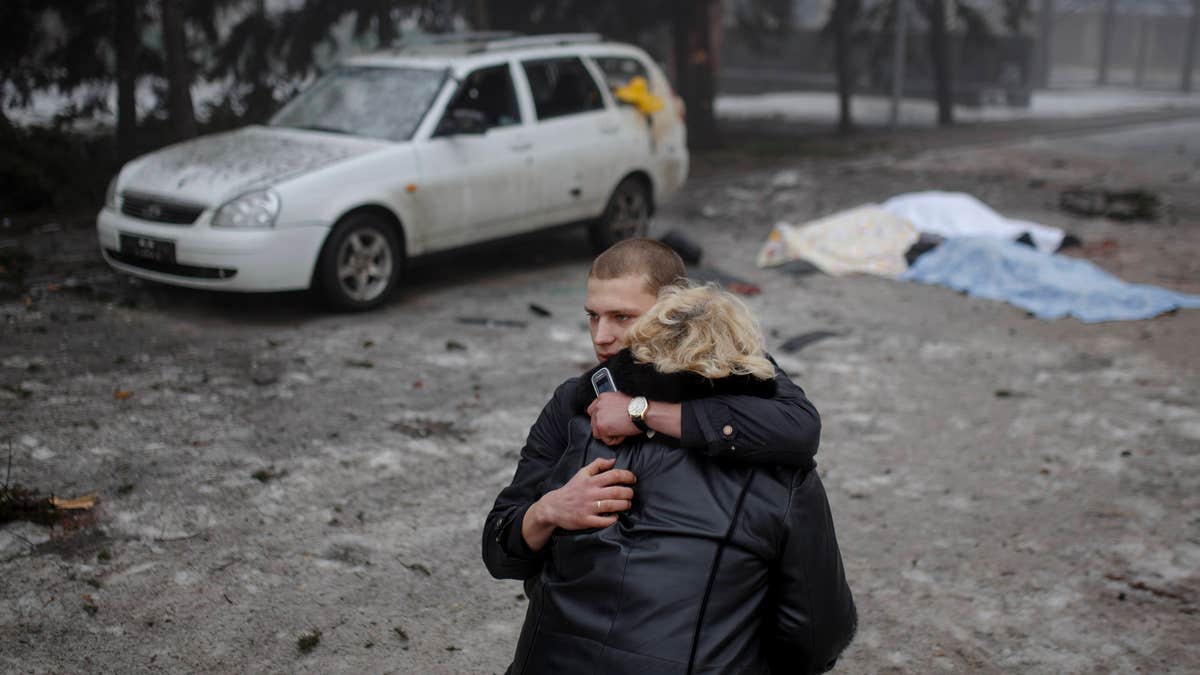
Jan. 30, 2015: A rebel comforts a wife of a killed civilian in shelling in Donetsk, eastern Ukraine. (AP)
DONETSK, Ukraine – Artillery fire killed at least 12 civilians in the main rebel stronghold of Donetsk on Friday amid fierce fighting between pro-Russia separatists and government troops as hopes for a break in hostilities were dashed when an attempt to call a new round of peace talks failed.
Five people were killed as they were waiting for humanitarian aid outside a community center and two people were killed in the same neighborhood when a mortar shell landed near a bus stop.
By the time an Associated Press journalist arrived at the community center, the bodies were taken away. Nearby trees were cut down by what could have been a projectile.
Five other people died Friday in sporadic artillery fire in the west of Donetsk.
Full-blown fighting between the Russian-backed separatists and government forces erupted anew earlier this month following a period of relative tranquility. Debaltseve, a railway hub which could prove a crucial link between the main rebel-held cities of Donetsk and Luhansk, has become the main focus of hostilities.
Separatists inched toward Debaltseve on Thursday when they burst through government lines into the town of Vuhlehirsk. The press office for Ukraine's operations in the east said Friday that rebels were mounting artillery strikes on government checkpoints and bases in Vuhlehirsk.
"Precision strikes are destroying the opponents' firepower, manpower and machinery," the press office said.
The fighting is precipitating substantial hardship among the civilian population, which has been unable to leave the area. Debaltseve has been without electricity, running water and household gas for more than a week.
The United Nations on Friday voiced concern about the deterioration of the humanitarian situation in Debaltseve and other densely populated areas in eastern Ukraine where intense fighting is going on. Neal Walker, the U.N. Humanitarian Coordinator in Ukraine, has called for an immediate humanitarian truce to allow humanitarian assistance and evacuation of civilians.
"Indiscriminate shelling of civilians violates international humanitarian law and must stop," he said in a statement.
Shells also rained down this week on the government-held town of Svitlodarsk, 20 kilometers (12 miles) north of Debaltseve, destroying gas pipelines, toppling electricity pylons and putting the local hospital out of commission.
Residents across Svitlodarsk stood in huddled groups around the front entrance to their apartment buildings, by the steps leading to the basement, which are now doubling as bomb shelters. Many were busy chopping scrap wood and cooking meals of soup.
"A shell hit a gas pipeline. They turned everything off," said 40-year-old welder Oleg Plashchechnik, as he boiled water to make tea. "There is no power. But the children have to eat, we have to survive somehow."
Views among people in Svitlodarsk reflect the common split of attitudes reflected across much of the war-stricken regions of Donetsk and Luhansk. While some pleaded their support for a united Ukraine, others inveighed against the government for its role in a conflict that has claimed more than 5,100 lives, according to U.N. estimates.
With the hospitals in Debaltseve and Svitlodarsk now unusable, the grievously sick and wounded must embark on trips of more than an hour along roads targeted by artillery for treatment.
While clashes in east Ukraine rage, hopes are still being invested in reviving a peace process that has been undermined with every new day of fighting.
Two rebel representatives went to the Belarusian capital Minsk for peace talks on Friday, but returned to eastern Ukraine a few hours later after the Ukrainian representative failed to turn up. Leonid Kuchma, a former president who represented Ukraine in the previous rounds of talks, said that the rebels must send their chiefs to the talks, while rebels, in their turn, demanded that Kiev name a new envoy who will have more powers.
Donetsk rebel representative Denis Pushilin insisted that the rebels' ongoing offensive is a way to protect civilians from Ukrainian artillery fire and said they will go ahead with it unless Kiev stops shelling the rebel-held areas.
"The situation has worsened and it is forcing us to go on offensive," Pushilin told reporters in Minsk. "New victims are inevitable, I'm afraid."
Pushilin said they would be ready to resume the cease-fire that was brokered in September and withdraw heavy weaponry, but as long as the demarcation line takes into account the rebels' recent advance.








































